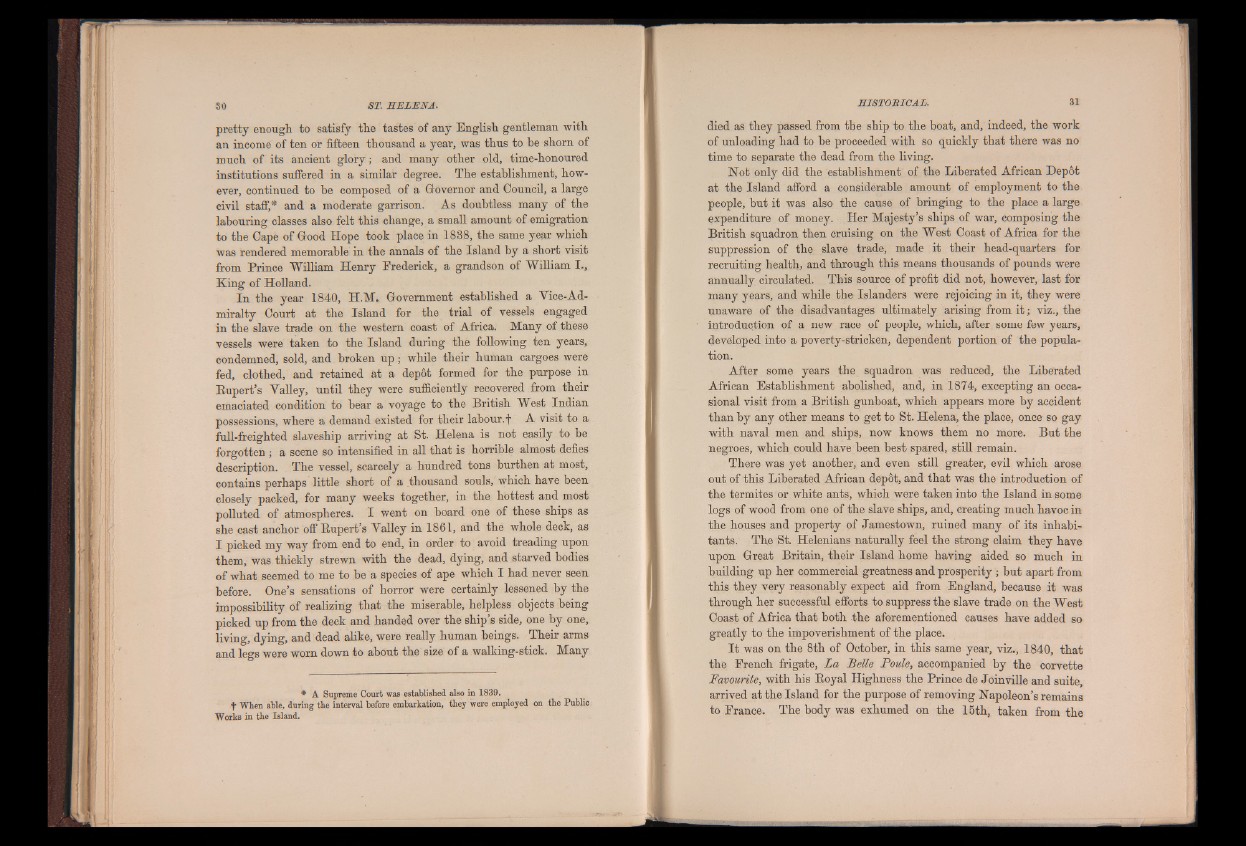
pretty enough to satisfy the tastes of any English gentleman with
an income of ten or fifteen thousand a year, was thus to he shorn of
much of its ancient glory; and many other old, time-honoured
institutions suffered in a similar degree. The establishment, however,
continued to he composed of a Governor and Council, a large
civil staff,* and a moderate garrison. As doubtless many of the
labouring classes also felt this change, a small amount of emigration
to the Cape of Good Hope took place in 1838, the same year which
was rendered memorable in the annals of the Island by a short visit
from Prince William Henry Frederick, a grandson of William I.,
King of Holland.
In the year 1840, H.M. Government established a Vice-Ad-
miralty Court at the Island for the trial of vessels engaged
in the slave trade on the western coast of Africa. Many of these
vessels were taken to the Island during the following ten years,
condemned, sold, and broken n p ; while their human cargoes were
fed, clothed, and retained at a depot formed for the purpose in
Bupert’s Valley, until they were sufficiently recovered from their
emaciated condition to bear a voyage to the British West Indian
possessions, where a demand existed for their labour .j- A visit to a
full-freighted slaveship arriving at St. Helena is not easily to be
forgotten ; a scene so intensified in all that is horrible almost defies
description. The vessel, scarcely a hundred tons burthen at most,
contains perhaps little short of a thousand souls, which have been
closely packed, for many weeks together, in the hottest and most
polluted of atmospheres. I went on board one of these ships as
she cast anchor off Bupert’s Valley in 1861, and the whole deck, as
I picked my way from end to end, in order to avoid treading upon
them, was thickly strewn with the dead, dying, and starved bodies
of what seemed to me to be a species of ape which I had never seen
before. One’s sensations of horror were certainly lessened by the
impossibility of realizing that the miserable, helpless objects being
picked up from the deck and handed over the ship’s side, one by one,
living, dying, and dead alike, were really human beings. Their arms
and legs were worn down to about the size of a walking-stick. Many
* A Supreme Court was established also in 1839.
When able, during the interval before embarkation, they were employed on the Public
Works in the Island.
died as they passed from the ship to the boat, and, indeed, the work
of unloading had to be proceeded with so quickly that there was no
time to separate the dead from the living.
Not only did the establishment of the Liberated African Depot
at the Island afford a considérable amount of employment to the
people, but it was also the cause of bringing to the place a large
expenditure of money. Her Majesty’s ships of war, composing the
British squadron then cruising on the West Coast of Africa for the
suppression of the slave trade, made it their head-quarters for
recruiting health, and through this means thousands of pounds were
annually circulated. This source of profit did not, however, last for
many years, and while the Islanders were rejoicing in it, they were
unaware of the disadvantages ultimately arising from it; viz., the
introduction of a new race of people, which, after some few years,
developed into a poverty-stricken, dependent portion of the population
.A
fter some years the squadron was reduced, the Liberated
African Establishment abolished, and, in 1874, excepting an occasional
visit from a British gunboat, which appears more by accident
than by any other means to get to St. Helena, the place, once- so gay
with naval men and ships, now knows them no more. But the
negroes, which could have been best spared, still remain.
There was yet another, and even still greater, evil which arose
out of this Liberated African depot, and that was the introduction of
the termites or white ants, which were taken into the Island in some
logs of wood from one of the slave ships, and, creating much havoc in
the houses and property of Jamestown, ruined many of its inhabitants.
The St. Helenians naturally feel the strong claim they have
upon Great Britain, their Island home having aided so much in
building up her commercial greatness and prosperity ; but apart from
this they very reasonably expect aid from England, because it was
through her successful efforts to suppress the slave trade on the West
Coast of Africa that both the aforementioned causes have added so
greatly to the impoverishment of the place.
I t was on the 8th of October, in this same year, viz., 1840, that
the French frigate, La Belle Poule, accompanied by the corvette
Favourite, with his Boyal Highness the Prince de Joinville and suite,
arrived at the Island for the purpose of removing Napoleon’s remains
to France. The body was exhumed on the 15 th, taken from the